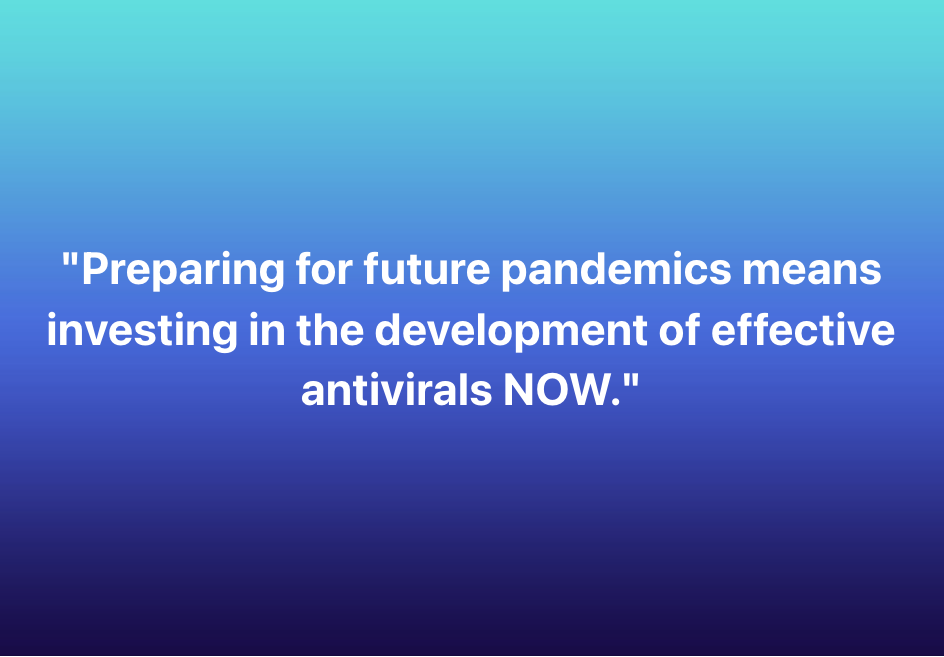Media Release: Nelson, New Zealand – 10 July 2024 – Kimer Med $10M closer to…
Antiviral development is critical for pandemic preparedness
Before covid-19 burst into our lives and onto our screens in 2019, the word ‘pandemic’ was not part of the daily vocabulary. It’s quite possible that I’ve never even used the word during my 46 years on this planet. Now, it seems like it’s part of the daily lexicon. So how do we best prepare for the next global outbreak caused by a viral disease?

Covid-19 was not the first pandemic, and it won’t be the last.
Looking back only 20 years there have been three other pandemics recorded – SARS (Severe Acute Respiratory Syndrome) in 2002-03, swine flu in 2009-2010, and MERS (Middle East Respiratory Syndrome) in 2015-ongoing. I vaguely recall watching televised news coverage of these events, and I vividly remember how sick I was when I caught swine flu, but none of these outbreaks had anywhere near the global impact of SARS-CoV-2.
Is avian flu the next contender virus?
To date, the majority of viral pandemics have been caused by strains of influenza A – also known as “the flu”. Of the six recorded flu pandemics, which date back to Russia in 1889-93, the majority are avian (related to birds), with the sole exception being the already-mentioned swine flu of 2009-10.
That’s precisely why there is growing concern at the current spread of an avian flu that has caused (either directly or through culling) the death of over 200 million birds, and has also been linked to the deaths of bears, skunks, minks, raccoons and seals. At least one case has been reported in humans too. In January of 2023 a young Ecuadorian girl became the first ever case to be reported in Latin America.
Part of the reason for concern here is that since its 1959 discovery in chickens in Scotland, H5N1 – often called “bird flu” – has spread to at least 19 countries and successfully made the leap from birds and animals to humans. In the last 20 years, nearly 900 human cases have been reported, and of these, more than half (53%) have resulted in death. That infection fatality rate puts H5N1 right up there in the upper pantheon of deadly viruses, around 24 times more lethal than Covid-19.
Thankfully, the risk of consistent bird flu transmissions to – and between – humans is still low. But the avian influenza is the type of virus that could spark the next pandemic, so we are wise to take notice and make sure we are as prepared as we can be.
Preparing for pandemics
In New Zealand, as in many countries around the globe, work is underway to strengthen and support global pandemic surveillance and response networks, as well as look at how we can improve our national health systems in the event of an outbreak.
Safe and effective antiviral treatments remain a critical tool in responding to infectious disease outbreaks, and therefore preparing for future pandemics means investing in the development of lifesaving interventions before these viruses of concern escalate into deadly pandemics.
Viruses are, and always have been a tricky target for drug development. That is probably why there are so few registered antivirals available, and still more than 200 viral diseases affecting humans for which there is no effective antiviral treatment, let alone a cure.
Antiviral drug development is a slow and expensive process, with many hurdles to overcome – the technical challenges, funding requirements and regulatory burdens are ever-present. Kimer Med has taken on these challenges under no illusions about the task we have set ourselves. We are very encouraged by the results we have already achieved and optimistic about the next stages of our research and development.
VTose, our antiviral ‘toolkit’ has already demonstrated the potential to work against a wide range of both clinical and priority viruses – these are the ones that are most likely to be behind the next outbreak or pandemic. In our view, it is critical that antiviral development is supported, well-funded and prioritised as part of both national and global pandemic preparedness efforts.
*****
You can support our work by following, liking and sharing our posts, by donating, and by helping us to spread the word about antiviral development. Thank you.


